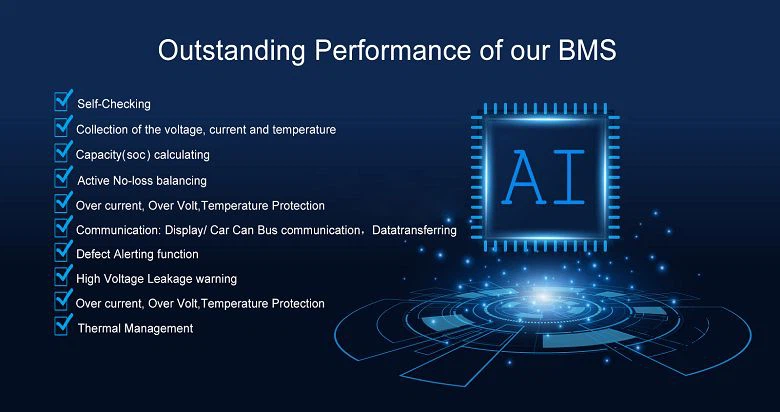I: Briefly describe the BMS lithium battery management system
As we all know, the BMS is mainly used in lithium batteries, and lead-acid batteries generally do not have this management system. The trend of lithium batteries on the market is steadily rising, precisely because lithium batteries require one more BMS than lead-acid batteries to protect the cells. In short, BMS is a system to manage, control, and use lithium battery packs. BMS is the "Brain" of the lithium battery operating system, receiving and sending information from the battery and each external port, in-depth analysis and processing of the information, and outgoing work orders. Therefore, BMS is a bridge between the battery and the user, supervising the battery state, preventing the battery from overcharging and over-discharging, and ensuring safety. BMS determines the status of the entire battery system by detecting every single cell in the battery pack. BMS adjusts the battery system according to the single cell status and realizes charge and discharge management to ensure a safe and stable operation.
II. Why do lithium batteries
need BMS

Lithium batteries need protection, according to the characteristics of lithium batteries. Excessive charging and discharging will damage the chemical composition inside the battery, shorten the battery life, and even cause serious consequences. Overcharging will also cause the battery to heat up and cause safety hazards such as fire. To ensure safety, the use of lithium batteries needs to meet safety requirements:
1. Basic protection requirements: overcharge protection, over-discharge protection.
2. Strengthen protection requirements: Over-current protection, high-temperature protection, low-temperature protection, short circuit protection, reverse polarity protection.
3. Expansion requirements: good balance performance, low-pressure difference, a low-temperature difference.
Therefore, a special protection system is required to monitor the health of the lithium battery and manage its normal operation. To reduce maintenance workload and cost, BMS has the function of charge estimation, which can accurately grasp the charge state. At the same time, BMS has lower power consumption to reduce the maintenance frequency and prolong the service life of lithium batteries.
